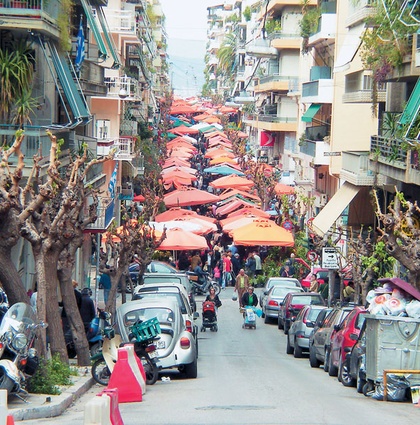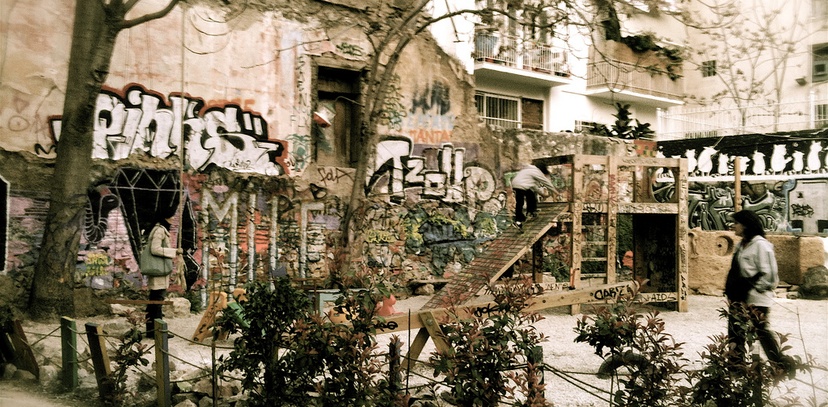

Zoe Spiliopoulou considers how, even in the midst of tough austerity measures, Greek citizens continue to celebrate communal bonds through their public spaces. This article is part of the Social Life of Cities series with the Urban Times.
For the past five years austerity measures have taken a heavy toll on everyday life in Greece. Despite this, as a Greek citizen, I feel that Greeks have strong social bonds and networks that are closely linked to public and communal spaces in cities and neighbourhoods, which are helping communities survive these difficult times.
Generally speaking, the social life of neighbourhoods in Greece is connected to public life and public amenities that are provided by the government. Unlike the growing trend towards the privatisation of public spaces in London and many other cities in the world, the public space in Greece remains publicly owned.
Public institutions in Greece are part of the public realm; they are tied to peoples' experience of places and play an important role in enhancing a local feeling of social unity. For instance, most of the schools are public and are open all year round to accommodate children's after school activities. Universities are the symbol of free dialogue and exchange of ideas, and thus, even today, they are public and free. Another exceptional example are the public markets. Organised by the local authorities, they take place in squares or streets of all the cities and neighbourhoods of Greece. Apart from being places that sell local produce, they offer the opportunity for people to socialize, create dialogue and exchange ideas.
In this article I would like to focus on the neighbourhood of Exarchia. It is an activist-led neighbourhood in the centre of the capital. I will take a look at how Exarchia it is representative of contemporary Athens and show how local social life can help to build the resilience of a community.
The neighbourhood of Exarchia consists of diverse groups of people. Although this is common in other parts of Athens, in Exarchia there is an unusual co-existence and cooperation among these groups. Greek families, foreign migrants, students and the elderly are most visible in the area. The social life of Exarchia is strong and the range of activities is wide - from events that enhance neighbourliness to public protests that affect the entire country.
Many older residents, having grown up in this area, have had the chance to witness the changes to their urban environment over the last 50 years; changes that have shaped the current urban space in the area, and life of Exarchia and of Athens as a whole. Many of the older residents, despite these changes, still walk around its streets and go to the same cafes, taverns and the public markets that exist as reminders of the past. Younger families of locals and migrants enjoy the facilities that the area offers them too. Their children attend the local public schools or play on the streets, the squares or the parks - an experience that tends to disappear in downtown Athens.
Four different universities are located within the area and so there are high numbers of students too. Having studied architecture there myself, I am one of the thousands of students who moved through the streets of Exarchia and hang out at the "Chartes" local cafe, "Intriga" bar, "Circus" club, "Fasoli" restaurant and the park at Navarinou Street. A long history exists of riots and social protest that have started at the School of Architecture. The December 2008 riots in Greece were sparked by a fatal incident that took place in Exarchia. This has created an environment of political awareness and discussion about contemporary social issues.
The common perception of Exarchia from people that don't live in the area is that it is unsafe, particularly because there are marginalised groups visible on the street, often thought to be involved in drugs. They are seen wandering around, asking for money or food, and their presence on the streets, combined with knowledge of the riots, contributes to the image of Exarchia as an unsafe neighbourhood.
Despite the local tensions and economic climate, the community is not being passive. From community groups to time banks, there are many examples of ways in which the community is working to enhance the social life of Exarchia.
One example is a strong community group called the "Committee of Exarchia Residents Initiative". They usually organise children's events on the square or social activities intended to bring people together, to enhance social sustainability and wellbeing in the area. They also offer singing courses and have formed a local choir that meets on a weekly basis. Moreover, recreational nights and movie screenings are organised regularly in local cafes or communal spaces. Given the current situation in Greece, these nights now provide essential social support, offering free dinners or organising help for those who suffer the most.
Their latest activity includes the establishment of a time bank, a new type of exchange facility in Greece that enables residents of Exarchia to offer their knowledge and skills to their neighbours in exchange for time credits. Having accumulated time credits they can be "paid back" by using the skills and knowledge of other people. Time banking not only offers a chance of survival through the current crisis; it is a way for the people to create bonds and built social unity and awareness.
Apart from the local community, this neighbourhood accommodates political and social groups that are interested in the integration of the diverse people of Exarchia into Greek society. For example, the "Place for the Immigrants", located near the main square, takes care of new migrants from overseas who have recently moved into the area. It offers Greek language courses and computer courses, as well as recreational nights which are open to the public. The free social centre "Nosotros" was also set up experimentally in June 2005. The centre was established as a result of a desire to find an alternative meeting place, where people could be "free from restrains of ideological clichés and doctrines and therefore create their individual path in life". It is currently organised as a space that hosts social events that aim to engage people in discussions on contemporary issues.
One local campaign resulted in the occupation of two abandoned lots that were transformed into community parks. Having little support from the local government, the residents decided to do it themselves. The successful use of the spaces eventually led to the government's approval to manage these spaces. Children can nowadays enjoy the playgrounds, while the grown-ups can hang out in the green space.
Finally, one of the most important spaces that holds the community together: the Kallidromiou market. Every Saturday morning, a street that stretches along 3 blocks turns into a pedestrian area that accommodates the flow of people arriving from across the neighbourhood. Apart from providing locals with food, this public market plays a symbolic role in the community. It is a place of accidental meetings where the residents of Exarchia can talk about their problems and share their thoughts and interests. It is an opportunity for the people to use the street in a different way, and appreciate the use of the public space and the opportunity for social interaction that it offers them.
This notion is well articulated by world-renowned architect Ioannis Despotopoulos. According to him, the public market is the place where "the relationship between individuals was created and the need for the spread of news was discovered...the public market brought the beginning of social and ideological life"¹. On a bustling Saturday morning at the Kallidromiou market, Exarchia brings this philosophy to life.
¹Ioannis Despotopoulos: The ideological structure of the city, 1997.
Zoe is an architect and urban designer and a graduate of the Bartlett School of Architecture. Sociology of space is one of her greatest interests, and has affected the way she perceives architecture and urban design.
